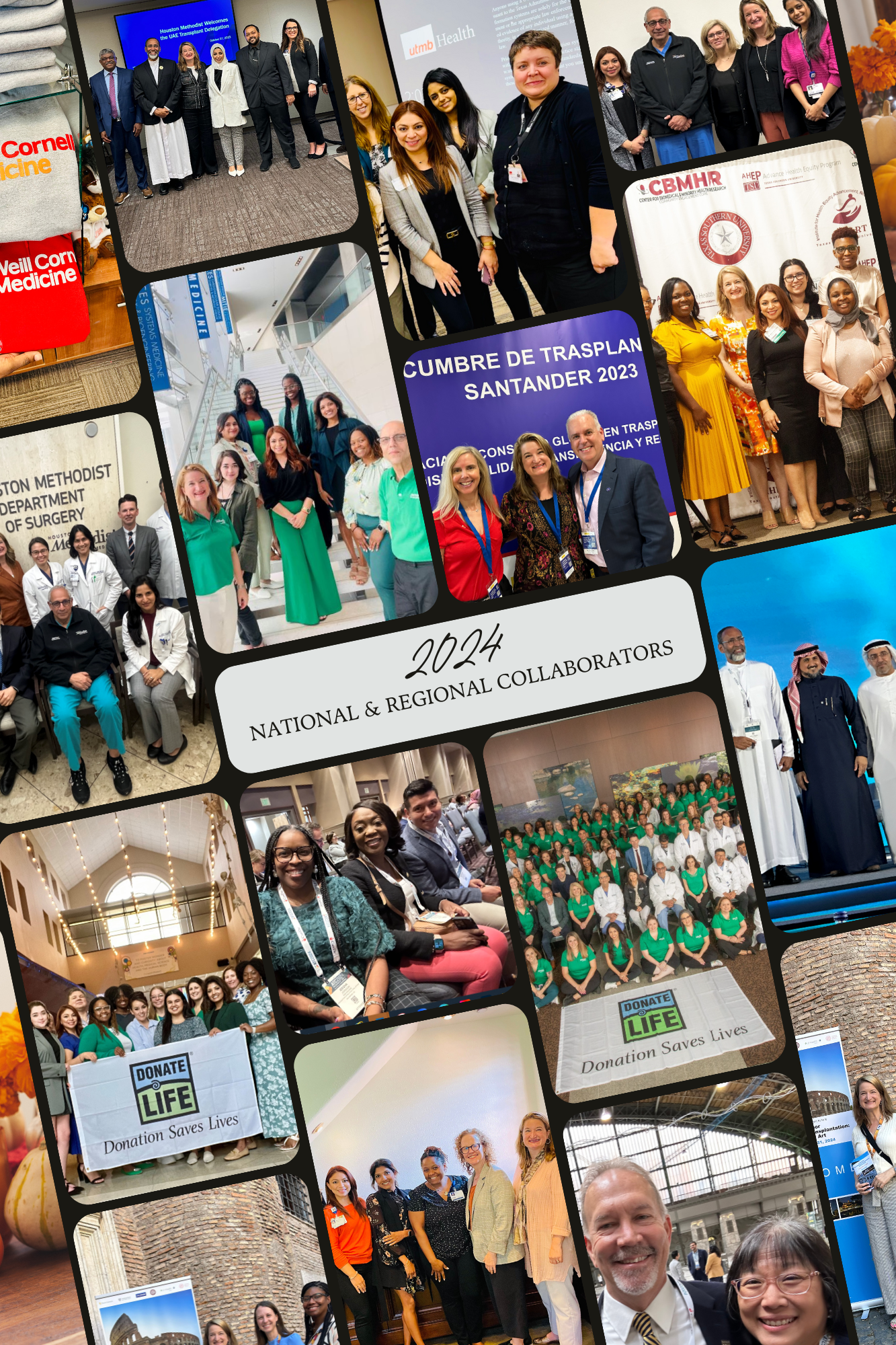Written by Solaf Al Awadhi, MBBS, MSc., Scientific Writer
As we close out 2024, the Patient Engagement Research Lab (PE Lab) celebrates a year marked by cutting-edge research, transformative partnerships, and impactful community engagement. It has been a year of global difference-making and transformative collaborations, driven by our mission to conduct patient- and community-engaged research that transforms healthcare, reduces disparities, and improves patient-reported and health outcomes—always honoring patients and what matters most to them.
It has been three years since the research laboratory moved from University of California-Los Angeles to Houston Methodist Transplant Center and Research Institute. According to our organizational consultant, we have already completed several natural phases of team building, from the early excitement of initially forming the lab to the challenges of stabilizing lab activities and trusting each other. Heading into 2025, the faculty and staff are grateful to have reached the stage of “norming,” where we know how lucky we are to work together, have identified each team member’s “best and highest use” and continue to grow forward stably. Grateful tears were shed at our Holiday Party, acknowledging each other’s growth and commitment to patients.
This year, the PE Lab achieved remarkable breakthroughs in research, with our team and affiliated researchers presenting 46 abstracts at 15 prestigious conferences, including the American Transplant Congress and the American Society of Nephrology. Our research areas address how to reduce disparities in organ donation, the transformative potential of artificial intelligence to improve transplantation outcomes, and pioneering strategies for delivering health literate patient education. LifeGift staff and scientists from the PE Lab representing the Deceased Organ Donation Performance Improvement Collaborative presented our first abstracts about the effectiveness of different interventions enhancing both the quantity and quality of deceased donor organs being transplanted at the American Transplant Congress. Additionally, we published 25 papers in high-impact journals, reinforcing our reputation as leaders studying the psychosocial, education, and ethical factors affecting organ donation and transplantation.
This year, we are particularly excited to have successfully established the Qualitative and Community-Engagement Research Core to listen to and better amplify patients’ voices. We trained many faculty and staff to conduct patient focus groups and use qualitative software to analyze transcripts and discover the common themes in what was shared. “Many healthcare professionals assume that they know best what their patients need. Our lab assumes that patients know themselves best and, therefore, that we must listen and partner with them to co-create new healthcare improvements,” says Dr. Waterman. The work of the Core has enabled us to uncover factors explaining health disparities and evaluate whether patients would find different interventions in both community and healthcare settings helpful.
Our community engagement efforts also continue to evolve and expand in 2024. We launched the Living Donation Storytelling Project, gathering over 60 powerful narratives from transplant patients and donors in English and Spanish. Other initiatives such as the Health Museum partnership and the Hispanic Living Donation Working Group helped raise awareness about organ donation, promote cultural sensitivity, and build stronger connections with underrepresented populations. These projects not only educated but also empowered communities to share their ideas about how to improve the field of transplantation. Our innovative research on digital storytelling to inspire living donation received widespread recognition, setting a new benchmark for patient-centered education and community-driven advocacy.
Finally, Dr. Amy Waterman, Director, has continued to expand partnerships with the PE Lab across borders. On the global stage, she participated in the Santander Summit in Spain, where her recommendations supported the development of guidelines to protect living donors that were adopted by the World Health Organization. At the Annual Organ Donation and Transplantation Congress in Dubai, she delivered impactful talks on patient engagement, diversity, and education in organ donation and transplantation. These contributions supported efforts to strengthen ethical organ donation systems and promote self-sufficiency in organ transplantation across regions worldwide. At the Living Donor Abdominal Organ Transplantation Conference in Rome, Dr. Waterman presented a talk on leveraging artificial intelligence to identify characteristics of different profiles of generosity in the general public to better target media campaigns. This international work also aligns with our regional collaboration with InformAI and Baylor College of Medicine, which achieved significant strides with TransplantAI, a state-of-the-art analytics platform being designed to optimize matching of deceased donation organs with ideal recipients.
Her contributions were recognized this year, as she received the Glen W. Karsten Memorial Award from The Living Bank, a nonprofit to eliminate the shortage of organs for lifesaving transplants by being a trusted education resource for living organ donation and the leading provider of advocacy services for living donors, this mission, acknowledging her unwavering dedication to advancing patient engagement and organ donation. “I was honored to receive the award and thanked the living donors for inspiring me and giving me such a wonderful life of service,” said Dr. Waterman. Watch a profile piece presented honoring her, here: Amy’s Honoree Video
As we reflect on 2024, over 250 faculty, transplant professionals and staff are working together to accomplish the mission of the PE Lab. The breakthroughs achieved this year set the stage for even greater impact in 2025. Together, we will continue to push boundaries, innovate, and ensure that organ donation and transplantation are accessible and equitable for all.

